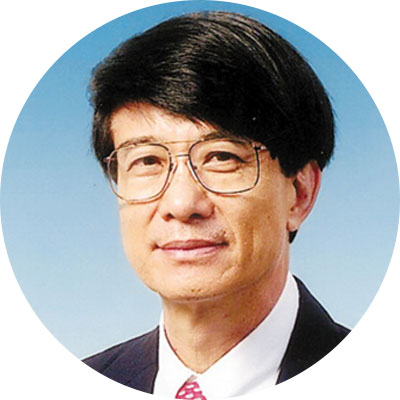Dr. Paul C. W. Chu is currently serving as Professor of Physics, T. L. L. Temple Chair of Science, and Founding Director and Chief Scientist of the Texas Center for Superconductivity at the University of Houston; and as Honorary Chancellor of the Taiwan Comprehensive University System. He is President Emeritus and University Professor Emeritus of Hong Kong University of Science and Technology. He was born in Hunan, China, and received the B.S. degree from Cheng-Kung University in Taiwan. After service with the Nationalist Chinese Air Force, he earned the M.S. degree from Fordham University, Bronx NY, and completed the Ph.D. degree at the University of California at San Diego, all three degrees being in Physics. He has been working on Superconductivity, Magnetism, and Dielectrics.
CURRENT AND PAST APPOINTMENTS: After doing industrial research with Bell Laboratories at Murray Hill, New Jersey, Dr. Chu held an academic appointment at Cleveland State University. He assumed his appointment at the University of Houston in 1979. He was Director of the Texas Center for Superconductivity at the University of Houston between 1987 and 2001. He had also served as consultant and visiting staff member at Bell Labs, Los Alamos National Lab, the Marshall Space Flight Center, Argonne National Lab, and DuPont at various times.
RESEARCH EXPERIENCE: He has been working on superconductivity since his days with Bernd T. Matthias at the University of California at San Diego. In January 1987, Dr. Chu and his colleagues achieved stable superconductivity at 93 K (-180 °C), above the critical temperature of liquid nitrogen (-196 °C). They continue to find new compounds with high transition temperatures. They again obtained stable superconductivity at a new record high temperature of 164 K (-109 °C) in another compound when compressed. Presently, he is actively engaged in the basic and applied research of high temperature superconductivity. His research activities extend beyond superconductivity to magnetism and dielectrics. His work has resulted in the publication of more than 700 papers in refereed journals.
HONORS: Dr. Chu has been elected as a member of the National Academy of Sciences, the American Academy of Arts and Sciences, the Chinese Academy of Sciences (Beijing), the Academia Sinica (Taipei), The World Academy of Sciences, the Royal Society for the Encouragement of Arts, Manufactures, and Commerce, the Academy of Sciences of Hong Kong, the Electromagnetic Academy, the Russian Academy of Engineering, and The Academy of Medicine, Engineering and Science of Texas, and is a Fellow of the American Physical Society, the Texas Academy of Sciences, and the Hong Kong Institution of Science. He has received honorary doctorates from Northwestern University, Fordham University, the Chinese University of Hong Kong, Florida International University, the State University of New York at Farmingdale, Hong Kong Baptist University, Providence University, University of Macau, Loughborough University, and Whittier College. In 1990 he was selected the Best Researcher in the U.S. by US News and World Report.
AWARDS: He has received numerous awards, including the National Medal of Science, the International Prize for New Materials, the Comstock Award, Texas Instruments’ Founders’ Prize, the Leroy Randal Grumman Medal, the World Cultural Council Medal of Scientific Merit, the New York Academy of Sciences’ Physical and Mathematical Science Award, the Bernd Matthias Prize (M2SHTSC), the Award of Excellence in Scientific Accomplishments (World Congress on Superconductivity), the St. Martin de Porres Award, the Esther Farfel Award (University of Houston), the John Fritz Medal (American Association of Engineering Societies), the Prize Ettore Majorana - Erice - Science for Peace, and the IEEE Council on Superconductivity Max Swerdlow Award for Sustained Service to the Applied Superconductivity Community. SERVICE ACTIVITIES: Dr. Chu serves on the editorial boards of various professional journals, has been a member of the President’s Committee on the National Medal of Science (USA) and the U.S. National Research Council’s Committee on Research Universities, and is a member of the board of directors of the Coalition for the Commercial Application of Superconductors.
cwchu@uh.edu
Superconductivity Science and Technology: From low-temperature to high-temperature and on to room-temperature superconductors; from ambient to high pressure and back to ambient pressure*
Abstract:
Superconductivity has been an ever-self-reinvigorating discipline since its discovery in 1911. It continues to generate excitement in science, materials, and technologies. One of the obvious hurdles to its full fruition in technology is to bring its transition temperature Tc to room temperature. In this talk, I shall first briefly review the impressive advancements made in low-temperature superconductivity (LTS) and high-temperature superconductivity (HTS) before the arrival of room temperature superconductivity (RTS). Accompanying the advancements made in superconductivity science and technology over the last century, a solid experimental framework concerning the search, development, and even authentication of new discoveries has been established. All these can serve as valuable references in the infancy of RTS research. In this spirit, we will comment on the current status of rare-earth hydride RTS and present our preliminary negative results on Lu-N-H and LK-99, the two most studied materials in the search for RTS in the last few months, although several reports of more negation than affirmation have appeared. However, I do believe that when old wishes are dashed, new hopes will arise.
*Research is supported in part by the Enterprise Science Fund of Intellectual Ventures Management, LLC; the U.S. Air Force Office of Scientific Research Grants No. FA9550-15-1-0236 and No. FA9550-20-1-0068; the T. L. L. Temple Foundation; the John J. and Rebecca Moores Endowment; and the State of Texas through the Texas Center for Superconductivity at the University of Houston.




